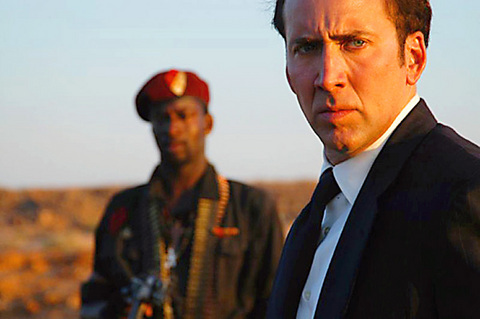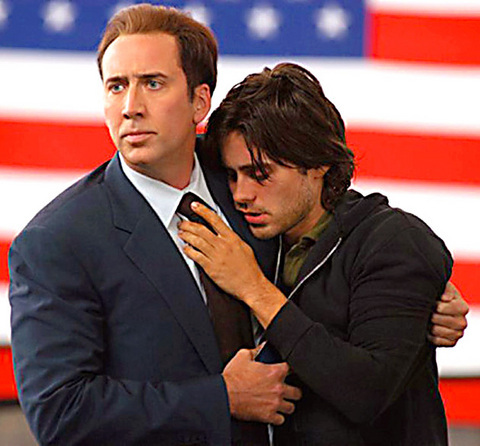Word of War, a misfire of a political satire about the
international gun market, opens with a killer scene: Nicolas Cage standing on a veritable carpet of bullet casings. Cage's character, Yuri Orlov, is a gunrunner who has placed untold weapons in untold numbers of hands. Now, surrounded by gutted buildings and dressed to impress, a cigarette burning between his fingers, Yuri looks straight into the camera and wonders aloud how he can furnish everyone in the world with a gun to call his very own.
This carpet of casings also serves as a launching pad for a subsequent and even more outlandish opening credit sequence that tracks a bullet from its manufacture in Russia to its final resting place in the skull of a young African. A bullet in the head always seizes the imagination or at least the audience's attention, but because the African is merely

PHOTO COURTESY OF FOX MOVIES
cinematic collateral damage, the image registers both as
showboating and as a warning shot for the problems to come. The screenwriter for Lord of War, Andrew Niccol, lavishes a great deal of time and many words building a case against guns;
unfortunately, the film's director, who also happens to be Niccol, enjoys playing with toy guns. His words may say no, but his overworked, overslick visual style says lock and load, baby.

PHOTO COURTESY OF FOX MOVIES
The problem, of course, is that violence is so inherently cinematic, so visually and aurally captivating. Loud pops, big bangs and the sights and sounds of bodies seizing up and spurting blood have long been the stock in trade of certain movies, which partly explains why the bangs are getting ever louder, the bloodletting more spectacular. The noise in these films has grown so deafening that it can be hard to hear the message (if there even is one), especially when that
message carries a familiar, been-there, done-that, eat-your-oatmeal-because-it's-good-for-you moralism. Like: guns are bad,
corporations are soulless, and some first world governments traffic in third world misery. To which any reasonably informed viewer might be expected to wonder, And your point is what, exactly?
Niccol's point here, it appears, is both to entertain and to instruct with the story of Yuri, a Russian emigre who rises from humble Brooklyn to become a
globe-trotting gunrunner with all the moral reasoning of a flea. Guided by Cage's intermittent voice-over, the story tracks Yuri's decades-long evolution as a merchant of death saddled with a few familiar distractions: a
beautiful model wife and a
drug-addled brother.
Yuri gets his break in the early 1990s when he snaps up materiel in the recently
imploded Ukraine that he
subsequently offloads in
war-ravaged Africa. Like
everything else in this film, Cage's performance is watchable if never credible because his director
never resolves the disconnect
between this star's function (to entertain) and that of his character (to repel).

Cheng Ching-hsiang (鄭青祥) turned a small triangle of concrete jammed between two old shops into a cool little bar called 9dimension. In front of the shop, a steampunk-like structure was welded by himself to serve as a booth where he prepares cocktails. “Yancheng used to be just old people,” he says, “but now young people are coming and creating the New Yancheng.” Around the corner, Yu Hsiu-jao (饒毓琇), opened Tiny Cafe. True to its name, it is the size of a cupboard and serves cold-brewed coffee. “Small shops are so special and have personality,” she says, “people come to Yancheng to find such treasures.” She

The low voter turnout for the referendum on Aug. 23 shows that many Taiwanese are apathetic about nuclear energy, but there are long-term energy stakes involved that the public needs to grasp Taiwan faces an energy trilemma: soaring AI-driven demand, pressure to cut carbon and reliance on fragile fuel imports. But the nuclear referendum on Aug. 23 showed how little this registered with voters, many of whom neither see the long game nor grasp the stakes. Volunteer referendum worker Vivian Chen (陳薇安) put it bluntly: “I’ve seen many people asking what they’re voting for when they arrive to vote. They cast their vote without even doing any research.” Imagine Taiwanese voters invited to a poker table. The bet looked simple — yes or no — yet most never showed. More than two-thirds of those

In July of 1995, a group of local DJs began posting an event flyer around Taipei. It was cheaply photocopied and nearly all in English, with a hand-drawn map on the back and, on the front, a big red hand print alongside one prominent line of text, “Finally… THE PARTY.” The map led to a remote floodplain in Taipei County (now New Taipei City) just across the Tamsui River from Taipei. The organizers got permission from no one. They just drove up in a blue Taiwanese pickup truck, set up a generator, two speakers, two turntables and a mixer. They

Former Chinese Nationalist Party (KMT) chairwoman Hung Hsiu-chu’s (洪秀柱) attendance at the Chinese Communist Party’s (CPP) “Chinese People’s War of Resistance Against Japanese Aggression and the World Anti-Fascist War” parade in Beijing is infuriating, embarrassing and insulting to nearly everyone in Taiwan, and Taiwan’s friends and allies. She is also ripping off bandages and pouring salt into old wounds. In the process she managed to tie both the KMT and the Democratic Progressive Party (DPP) into uncomfortable knots. The KMT continues to honor their heroic fighters, who defended China against the invading Japanese Empire, which inflicted unimaginable horrors on the